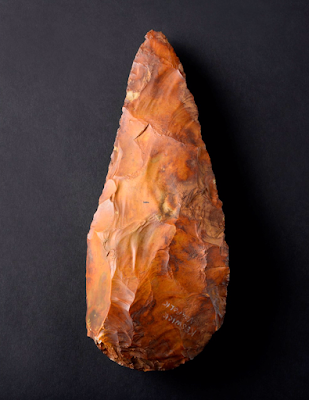THE FLINT AXE
The first immigrants to the Cap of the North area hacked their way
through the coniferous forest in search of wild animals and warm inlets
suitable for settlement. While doing so, they held on tight to the grey
flintstone which increases their force. They could swing their arm
in a large arc before striking their prey. They learnt how to bind
a shaft to the stone to increase the strength. The flint axe taught the hunters
to think. For no one can think without having seen fish in the sea,
fire in the forest, bird’s nests in the trees. Their thought was fed
by smelling the earth, religion came into being after the touch of warm hands.
From the earliest settlers on the planet we can trace not a line
but a circle with groping hands in dark tunnels, rhythmic
ring dances, epidemics that were overcome by the right use
of plants and bacteria, laurel wreaths. Occasionally
the circles meshed to form slender spirals. From snail shells to
the calm in the eye of the hurricane and distant galaxies. We can count
the Fibonacci spiral and gaze far out and into infinity from Cern
deep down in the rock and the launching ramp at Stovner. We understand
how we can twist and turn to draw maps of the universe and find
new means of survival. When Neil Armstrong set foot on the moon
he said: That’s one small step for a man, one giant leap
for mankind. A leap that would have been impossible without
the flint axe. He did not mention the fact. But it was with a firm
grip round our oldest implement, with four closely placed fingers above
and the thumb as a lock beneath that the journey to the moon began.
* Armstrong insists he said ‘for a man’ and not ‘for man’, but that people could not hear the ‘a’.
https://time.com/5621999/neil-armstrong-quote/

No comments:
Post a Comment